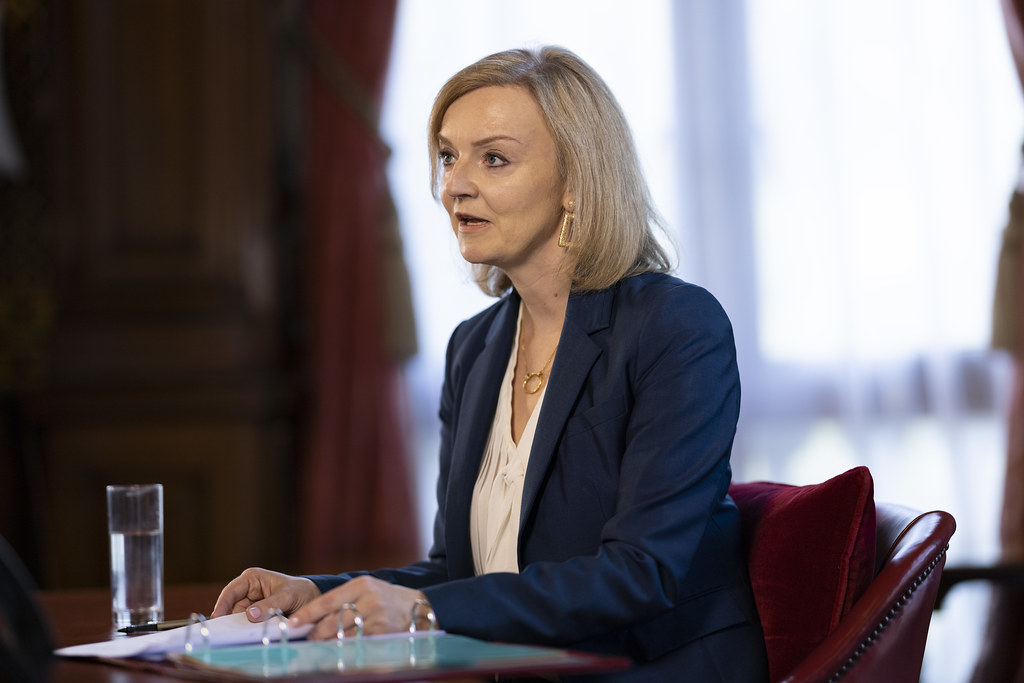LONDON (Parliament Politics Magazine) – While giving her keynote conference speech, Liz Truss promised to “get Britain through the tempest” and asserted that “everyone will benefit” from the outcomes of her economic policies. Greenpeace supporters heckled her.
The prime minister admitted that “these are stormy days” while speaking to Conservative members at the Birmingham event as she fights to retain her position as premier.
“In these tough times, we need to step up,” she said, adding that she was determined to get Britain moving, to get it through the storm and put a stronger footing as a country.
She went on to say that disruption occurs wherever there is change. Even though not everyone would be in favour, everyone will gain from the outcome.
Two Greenpeace protestors hoisted up a sign and heckled Ms. Truss, asking, “Who voted for this.”
In the conference room, security swiftly took them out.
Greenpeace claimed in a tweet sent out during the event that protesters were there to denounce the prime minister ‘shredding’ her party’s 2019 election commitments.
“The PM is U-turning on fracking, strong climate action, and world-leading environmental protections. Who voted for this?” the tweet said.
The PM went on to say that she and Chancellor Kwasi Kwarteng would keep closely co-ordinating the monetary and fiscal policy in the wake of the government’s record-breaking tax-cutting mini-budget that resulted in the pound falling to record level.
She and the chancellor were in lockstep on that and she would maintain an iron grip on the nation’s finances and would free Britain from its “high-tax, low-growth cycle,” she promised.
Ms. Truss claimed that in order to ensure that people can survive the economic crisis, she is working nonstop.
“So let me be clear: we have your back,” the PM said.
The 45p tax rate on top earners was eliminated, the PM said, but she and Mr. Kwarteng changed their minds since it became a distraction.
She addressed the audience, “I get it and I have listened.”
Truss made her push for economic growth the focal point of her address, cautioning that not everyone would like her upsetting plan to change Britain but asserting that the country will profit from the outcomes.
The challenge is enormous in scope. For the first time in a generation, there is war in Europe. After Covid, the world became more ambiguous. As well as a world economic catastrophe, she said.
Penny Mordaunt and Robert Buckland suggested this should happen, but Truss has repeatedly declined to state throughout the conference whether she will increase benefits in accordance with inflation, leading to a cabinet divide.
“I believe in sound money and a lean state,” she said.
The majority of Truss’ speech focused on her passion for reform, love of business, and deregulation. By the end of the year, she said, all EU regulations would be a thing of the past.
She also mentioned her own professional life, claiming that people had undervalued her.
She said, “I stand here today as the first prime minister of our country to have gone to a comprehensive school.”
After growing up in Leeds and Paisley in the 1980s and 1990s, Truss added that she was dedicated to promoting economic growth across the nation.
She understood what it was like to reside somewhere that wasn’t experiencing the advantages of economic growth, she remarked. She had observed closed businesses and people turning to drugs after being left with no hope.
Additionally, Truss lambasted political opponents who resided in “north London townhouses” and took a taxi to the BBC studios to present their arguments. She also mentioned those she believed to be a member of the “anti-growth coalition.”
She highlighted a number of groups she believed were opposed to growth, including Labour, the Lib Dems, the SNP, the militant unions, the vested interests, the talking heads, the Brexit deniers, Extinction Rebellion, and some of the people who were at the hall before.





